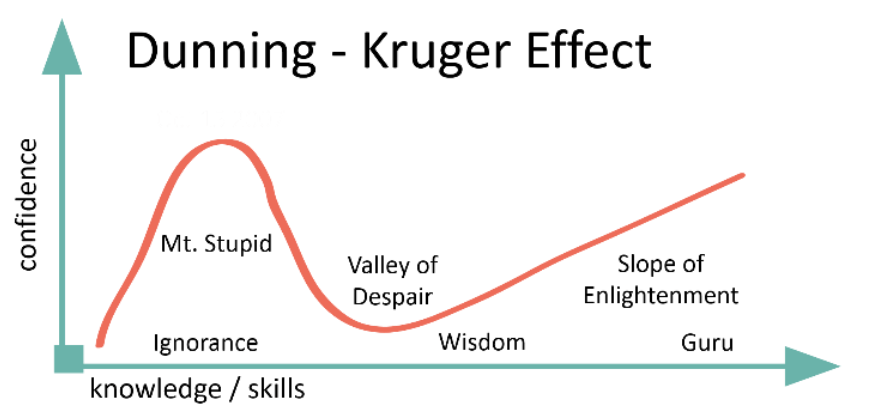Premise
The Dunning-Kruger effect is a sociological / psychological phenomenon whereby low-skilled individuals mistakenly think they are good at something. In other words, individuals lack the meta-cognition needed to give an unbiased evaluation of their competence, which leads to an unwarranted level of confidence -- or at least that is the case as measured by empirical studies of the present.
Analogy: The Internet
Following the recent advent of the internet, we live in a world with very accessible information, but not everyone gets the same utility out of this information. Just because the information is available, that doesn't change the facts on the ground: we have pluralistic cultures, many voices/interpretations, not to mention different innate cognitive abilities. In other words, just because we have easy-to-get information in the internet, doesn't mean everyone accepts it and/or understands it, or has time to try. It's an interesting facet of the Dunning-Kruger situation, but developments are still ongoing; it's hard to make definitive claims. I'm certainly not trying to make definitive claims either, I'm just trying to give my question more insightful context. Nonetheless, the internet analogy will provide an antertaining baseline for this thought experiment.
World
Instead of providing easy access to information like the internet, let us imagine that in the near-future trans-humans hardwire the information to their brains. This is done by implanting neural computer chips in their brains. Consider the chips to be your stereotypical neural chip implant, capable of downloading a wealth of information and allowing the trans-humans to learn calculus, foreign languages as well as a multitude of other knowledge bases instantly. The idea is that with a neural chip, we no longer have data or knowledge in the nominal sense, but also the ability to implement. Suffice to say the neural chip will be the equivalent of having the software and user manual all on-board (as the comments are right to point out: a table of engineering formulae are not the same as an engineer) Let's also stipulate it is a distributed network that updates itself via some fancy algorithm when/if the hard-wired knowledge is outdated (something new is learned).
Aftermath
Now that we have distributed the pinnacle of mankind's knowledge in a uniform fashion, I'm curious as to what becomes of the Dunning-Kruger effect. Here are my observations:
What works in neural chips favor:
- Uniformity of knowledge: everyone has the same level of knowledge, so presumably no one's confidence will be higher or lower than anyone elses
Skepticism:
- Specialization: there are so many skills, knowing everything there is to know in the universe might just be hubris
Question
Is there reason to believe that having the entire corpus of mankind's knowledge stored on a neural-chip would ameliorate the Dunning-Kruger effect, or would it just make it worse? Why?
Asumptions:
- Absolute benevolence: there are no bad actors installing neural implants to brain-wash people or otherwise control their minds
- Universal hardware/software: there are no "VIP" trans-humans who have superior neural-chips or better knowledge software. Everyone has equal equipment installed
- Muscle-memory: fine motor skills also can be downloaded, so we can have Matrix kung-fu and piano playing hands
- near-future: we already have chips in animal brains and can transfer basic data, let's assume it's not too far off

